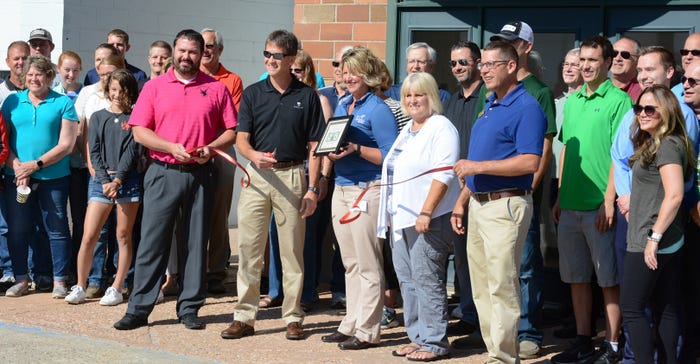
OFFICIAL OPENING: Beck’s Hybrids hosted a ribbon-cutting ceremony July 11 at its new Olivia, Minn., site. Beck’s president Scott Beck, with scissors in hand, celebrated with visitors.Paula Mohr
Indiana-based Beck’s Hybrids has purchased a former corn canning plant in Olivia, Minn., and remodeled it into a 44,000-foot distribution and research facility.
Following a ribbon-cutting ceremony July 11, visitors were given tours of the building where Beck’s staff will be based for sales support; seed will be packaged and stored; and scientists will conduct corn breeding and corn and soybean research.
“We feel very welcomed in Olivia,” said Scott Beck, president of Beck’s, as he stood surrounded by local residents who attended the ribbon cutting. Given that Olivia considers itself the “Corn Capital of the World,” locating here was a natural fit for the company, he said.
Beck’s, which was started by Scott’s great-grandfather and grandfather in 1937 in Indiana, has grown to be the third-largest seed brand in the U.S. and sells seed used on 60% of the nations’ corn and soybean acreage. They’ve gradually expanded their market reach and most recently moved into northern Iowa, southern Minnesota and eastern South Dakota. The company also serves farmers in Illinois, Kentucky, Michigan, Missouri, Ohio, Tennessee and Wisconsin.
“Once we moved into Iowa, it made sense to look into Minnesota,” Beck said. Plus, they had farmers here asking that they offer service in the North Star state.
“We desperately needed distribution in Minnesota,” he added. “We like to be three to four hours within distribution to farmers.”
Gearing up
Beck’s Olivia corn breeding and research team currently consists of five full-time employees. In 2021, the company plans to add two more team members. Up to 30 part-time employees will be hired during the summer to help with seasonal research activities.
Currently, Beck’s has 36 dealers across Minnesota. The furthest north dealer is near Fergus Falls.
This growing season, the Olivia corn breeding team has around 30,000 rows of corn at rented test sites. Beck said they plan to triple that number up to 90,000 rows by 2021.
Beck’s also is collaborating with a French seed company, RAGT, to develop a 90- to 105-day relative maturity corn. The company plans to sell convention varieties first and traited varieties about a year later.
RAGT is the third-largest seed company in Europe.
Kevin Cavanagh, head of Beck’s research in Indiana, said Becks’ started working with RAGT five years ago and has been testing different corn maturities in Minnesota for the past four years.
“Germ plasma that fits in southern France also fits in southern Minnesota,” he said.
In addition to the breeding program in Olivia, Beck’s has two breeding programs in Marshalltown, Iowa, and three breeding programs at its headquarters in Atlanta, Ind. To help increase efficiencies, shorten breeding cycles and increase genetic gains per cycle, Beck’s has a state-of-the-art molecular marker lab at its headquarters.
Offering farmers good service, company agronomic testing — known as Beck’s Practical Farm Research program — and 100% free replant policies on its corn, soybeans, wheat and alfalfa products are key components of Beck’s business model.
Beck’s grandfather started the concept of providing free replant seed decades ago.
“It was a unique philosophy,” Beck said. “It was his means of dealing with farmers who faced challenging springs, or even if a planter was set wrong. Grandfather provided free replant seed and it’s been that way ever since.”
Given the high cost of seed these days and weather extremes, Beck admitted that 2017 was their highest replant year for corn and second highest for soybeans, costing the company millions of dollars. However, 2018 ended up as Beck’s lowest replant year and allowed the company to recover financially.
The Practical Farm Research program started in the mid-1960s when Beck’s dad returned to the family business after graduating from Purdue University. PFR goes beyond testing company seed. It includes various agronomic practices and products of interest to farmers. One of Beck’s PFR cooperative sites is AgRevival in Gibbon, Minn., managed by founder and agronomist Nate Firle.
For more information, contact Beck’s at 800-937-2325 or visit beckshybrids.com.
For more information on AgRevival, call 320-979-4835 or visit agrevival.com.
About the Author(s)
You May Also Like






